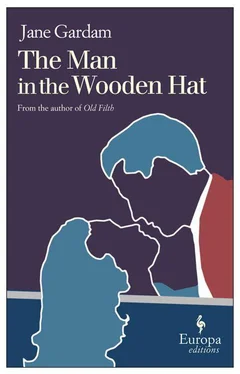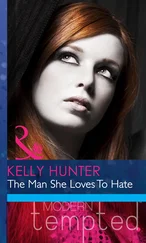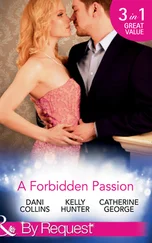I am wonderfully, deeply tired and I want him again. And again. And for ever. And I don’t mean Edward.
She wandered the street stalls, licking the prawn juice off her fingers. She peered into fragments of looking-glass, demons and cartoon toys. Wherever she went among the stalls were clusters of children eating where they stood, quietly, prodding their chopsticks into thimble dishes of fish and pork. Oh, how could I ever go West again? I’ll stay here. With anyone who wants me. One or the other. With anyone.
She had shocked herself. She had meant it. She’d go with a man who would let her roam in the market. “I’ll go down fast,” she told the poster. The girl with the rose now did not look like Lizzie at all. It was some American film star. Hedy Lamarr. She wondered how much the girl had been paid.
She was in the Old Col Hotel again. It was half past four in the afternoon. Make-up? Borrow Lizzie’s. (God, I look tired.) Dress? Green dress. I forgot to get them to iron it. It smells and I don’t care. I’ll never, never own such a beautiful dress again. And nobody will ever know. He won’t be there. Not at Edward’s party with its “wonderful news’—whatever that is.
When she was dressed she looked — after a little hesitation — out of her window and saw a white Mercedes parked outside, its windows dark and its number plate so short it looked like royalty.
“I shall certainly not hurry,” said the new Elisabeth and sauntered forth, her hair curly again, springy after the shower. I’m walking differently, she thought. They say you can always tell when a virgin is a thing of the past.
The car with the black windows gave no sign of remarking on her non-virginal condition, her walk, or on anything about her. When she stopped beside it nothing happened and she felt snubbed. If there was a driver inside, he was invisible. This was not a car you could tap or try a door handle. It might set off some terrible alarm.
The crowds were surging now from work. They parted around the Mercedes and then came back together again beyond it. Nobody looked at her or noticed her. As Nick had said this morning at the noisy family flat, “You get lonely here, you know. It’s not that they dislike you so much as that they aren’t interested. They just blot you out. Just occasionally they make it plain. You can be sitting on a bus with the only empty seat the one beside you, and there’ll be Chinese standing thick down the middle of the bus all down the centre aisle, and there’ll never, ever, be one of them who will sit down beside you. We are invisible.”
Elisabeth, standing in her green dress by the car, now felt invisible. She decided to turn back. After all, I’m not just anyone . She would go back to the bedroom and wait to be properly taken to Edward’s party. I am a grown woman.
And yet, I’m still telling myself stories. I have not had the courage to throw away childish things. You’d never take me for a linguist and a sociologist and an expert in ciphers, and all of it after being in the Camps. There is something missing in me. I’m empty.
Tears began to come. She knew that it was love that was missing. Edward was missing. She had forgotten all about him. Put him ruthlessly into memory.
“Good afternoon,” said someone behind her and she looked down to see a very short, thickset troll of a man wearing a brown felt hat. He removed it.
“I am Albert Loss. I cannot say my ‘ahs.’ I am the instructing solicitor and almost lifetime friend of Mr. Edward Feathers QC. I am instructed to drive you out to Repulse Bay to dine with him.”
A white-uniformed driver now stood beside the car’s opened doors. She was put behind the driver and Ross next to her on a built-up seat that set them on a level. The air-conditioning after several minutes was cool and silent, and the car slid carefully through the crowds and away.
“You said something—” she turned to Ross. “You said something like ‘QC.’ Edward is too young to be made a Queen’s Counsel.”
“He has just been made one. I mentioned it in my telephone message.”
“No! Has he? I never took it in. Oh, how wonderful! He never told me he’d applied. Oh, I see! Now I see. This is to be a celebration.”
“Not altogether. He has other things to say. I shall leave the rest to him.”
“Oh, and he so deserves it. Oh, I hope he’s letting himself be happy about it.”
“He will never let on,” said Ross, “but he has been frequently smiling.” He removed his hat, turned it over, unzipped a small zip inside the crown and removed a pack of cards. He did up the zip again, dropped the hat to the floor and set up a little shelf. He began to deal himself a hand.
“I like cards, too,” she said. “But will there be time? I thought we were almost there.”
“There is always time for cards and reflection. They are an aide-memoire. I am a compulsive player and I have a magnificent grasp of fact. My memory has been honed into an unbreakable machine. There is half an hour more of this short journey. We have to make a diversion on the way.”
“Won’t Edward wonder? Worry?”
“He knows you are with me.”
“But where are we now?” She looked through the one-way glass window. “You can’t be driving a car like this up here.”
“It will take little harm. I agree that my London Royce would be more appropriate. And the card tray there is firmer.”
“But this is an awful place. Wherever are we going?”
Stretching away were building sites and ravaged landscapes. Squalor and ugliness.
“It is your bread and butter — shall we say our bread and butter? And also our caviar. We are approaching the reservoirs, the sources of legal disputes that will support us all for years to come. Off and on.”
“But it’s horrible! It’s a desecrated forest. It’s being chopped down. Miles and miles of it.”
“There are miles more. Miles more scrub and trees. They will all, of course, have to go in time, which is sad since so much was brought here by the British. Like English roses in the Indian Raj the trees here grew like weeds. It was once a very good address to have, up here, you know. The dachas of the British. I still have a small one here myself, just to rent out — here we are in the trees again — which I intend to sell. The area is not safe now after dark. The reservoir workers begin to frighten people. They troop through the trees at sundown, like shadows. Here we are. My little investment.” And the car stopped in a glade on a mud patch where a dilapidated wooden box of a dwelling seemed to have become stuck up a tree.
“Oh, no!” she said. “Oh, no — oh, no!”
The zigzag notice Danger of Death was in place at the foot of the ladder. The driver lifted Ross out of the car and locked the car again behind him and Elisabeth inside watched the little man unlock the gate, shuffle painfully up the ladder stair, unlock the front door and disappear. When he came out again the driver lifted him back to his seat, relocked the car doors.
Ross sat on his perch and said nothing.
“Can we go? Can we please go now?” she said. “Please, I don’t like it here, it’s horrible.”
“I let it by the hour,” he said. “Night or day. It has been a good investment.”
“It’s disgusting. Vile. Please can we go to Edward? Tell him to start the car. Does Edward know you own this?”
“Certainly not. When I bought it, it was for myself. A haven of peace in my difficult life, watching the cards. But I have let things slide. I live in so many places. I let it, in a very discreet way. And I am getting rid of it now.”
“Yes. Please. Can we go?”
“On one condition,” said the dwarf. “That you will never think of it or of any such place again.”
Читать дальше












